After last week’s meeting between Palestinian Authority Chairman Mahmoud "Abu Mazen" Abbas and Jordanian King Abdullah, an official within the PA said that "the Palestinians and Jordan share a common concern about the possible strengthening of Saudi Arabia in Jerusalem and in Al-Aqsa in particular.” While just a few years ago the thought of a Saudi presence in Jerusalem would concern Israelis far more than their Jordanian and Palestinian peers, it seems the tables have completely turned. Even though no official Saudi or Israeli statement has been made on the matter, there are many rumors that the Saudi Kingdom as part of their normalization with Israel will seek a more ‘hands-on’ approach to the Palestinian issue; the question is why would the Chairman of the PA be so terribly concerned with such a noble thing.
The current situation in East Jerusalem and the Temple Mount compound, including Al-Aqsa, has become increasingly complicated. While on a de-facto level, Israel and its municipality of Jerusalem have sovereignty and operate as a unified government over the entire city, the PA still views East Jerusalem as its capital and on many occasions declares so, despite not having any functioning institutions there. All this is happening while another player is still heavily invested in the city, Jordan. The Hashemite Kingdom has been maintaining the existing Waqf on Al-Aqsa since 1948. According to the Jordanian Waqf, their job includes "implementing the Hashemite custodianship over Islamic and Christian holy sites and endowments and consolidating the historical and legal status quo."
While the Saudis 🇸🇦 have been investing in Mecca and Medina, the Waqf in Jerusalem has been focusing on desecration and destruction. Time to #StopWaqf #أوقفوا_الأوقاف Awqifu Al awqaf and replace with a responsible party 🇮🇱🇸🇦. pic.twitter.com/qQ95wCYo0z
— Avi Kaner ابراهيم אבי (@AviKaner) April 18, 2022
While the Waqf has some practical elements, such as Jordanian appointed security on the Temple Mount to prevent Jews from entering during certain hours, it is largely seen as a way Jordan can legally continue to have a say on Jerusalem matters, even with no substantial sovereignty or authority. Together, the Palestinian Authority and Jordan have created a fictitious set of laws for East Jerusalem and the Temple Mount under the guise of the “historical status-quo”. These laws have kept Israel and any other regional player from moving forward with real peace initiatives; after all, who would want to be accused of permanently ‘desecrating’ Jerusalem holy sites?
There is, however, one well-established Arab government powerful and dominant enough to take the heat from Palestinian nationalists and the Jordanian Kingdom: Saudi Arabia. Since the semi-violent departure of the Hashemites from Mecca and Medina in the first part of the 20th century, the Saudis have been the respected rulers of Islam’s holiest site and have perhaps the largest impact on mainstream Islam in the Arab world. In addition, the Waqf that Jordan has been maintaining is not exclusive to their kingdom but to any Muslim entity with the means to protect the grounds mentioned in it; something Saudi Arabia has far more than any current dysfunctional Jordanian-led security service for Al-Aqsa.
Still hope for a 2 state solution: Jordanian Hashemite marries Saud and unites the 2 kingdoms. West Bank becomes a Saudi province. (East) Jerusalem holy sites join Mecca and Medina under Saudi sovereignty. 2 states: Saudi Arabia and Israel. Partnership will be a world force.
— Osip (@Osip77705129) August 12, 2023
For the Royal Hashemite Court of Jordan, a Saudi takeover of the Waqf with physical presence in Jerusalem simply means the end of an era of unchecked power in the holy city. But for Abu Mazen and his Palestinian Authority, Saudi intervention in Jerusalem means that the needs of the Muslim population in Israel and the PA will be put ahead of their lust for power. If such a scenario would unfold, Saudi Arabia would likely use their newly given power in Jerusalem and the PA to maintain order, but also operate for the sake of Islam as a means to solidify its place in the Arab world with significantly less consideration for nationalist movements such as Palestinian activism.
These Islamic considerations also do not necessarily go against a system of deeper cooperation with the Israeli authorities for the upkeep of Jerusalem’s holy sites, which is something neither Jordan or the Palestinian Authority are willing to do. Finally and based on everything mentioned above, Saudi presence in the Holy Land would place the PA on opposite sides with the current rulers of Mecca and perhaps of all mainstream Sunni Islam, and considering that Palestinians have pivoted from an allegiance to Sunni Islam in favor the Shiite rulers of Iran, it appears they already have crossed that threshold. Saudi-Israeli normalization and their plausible presence in Jerusalem is by all means being interpreted by Abu Mazen as the crumbling of Muslim and Arab unity for Palestine.


